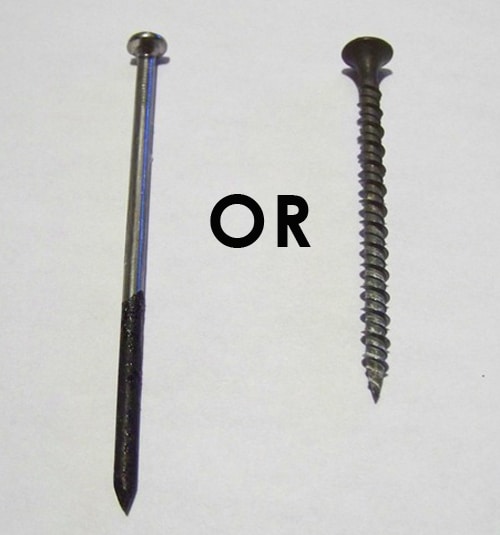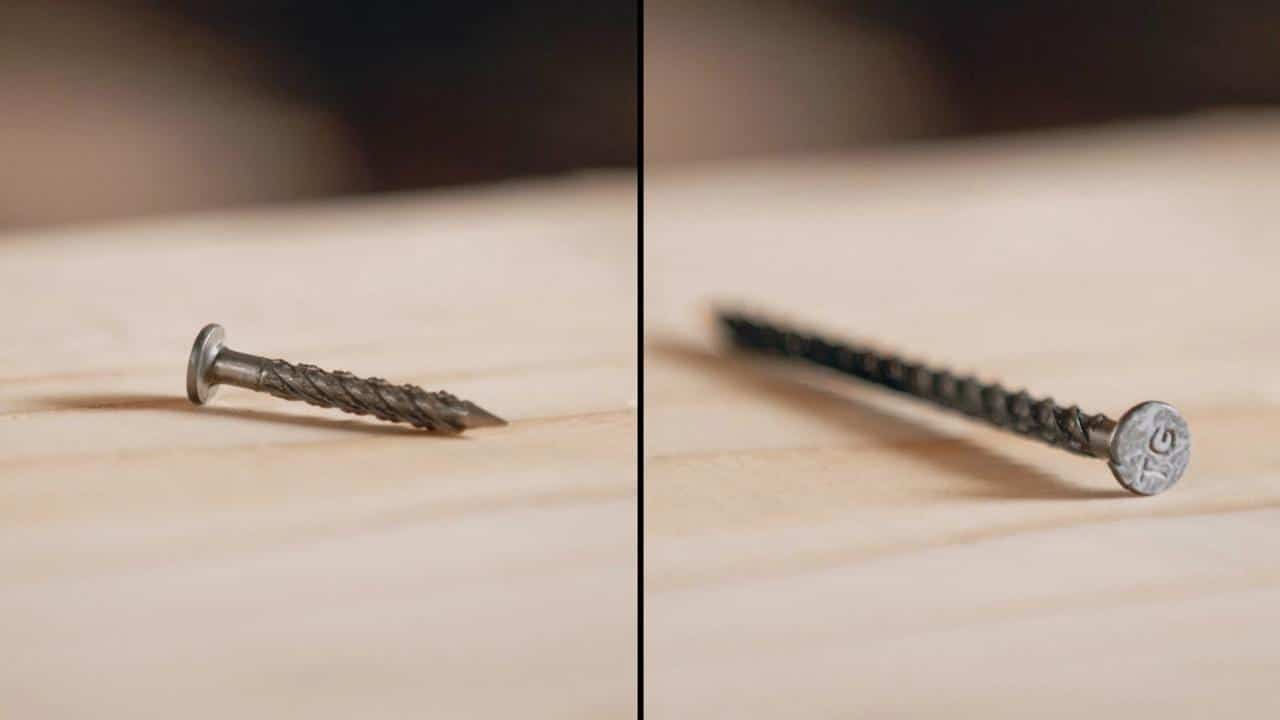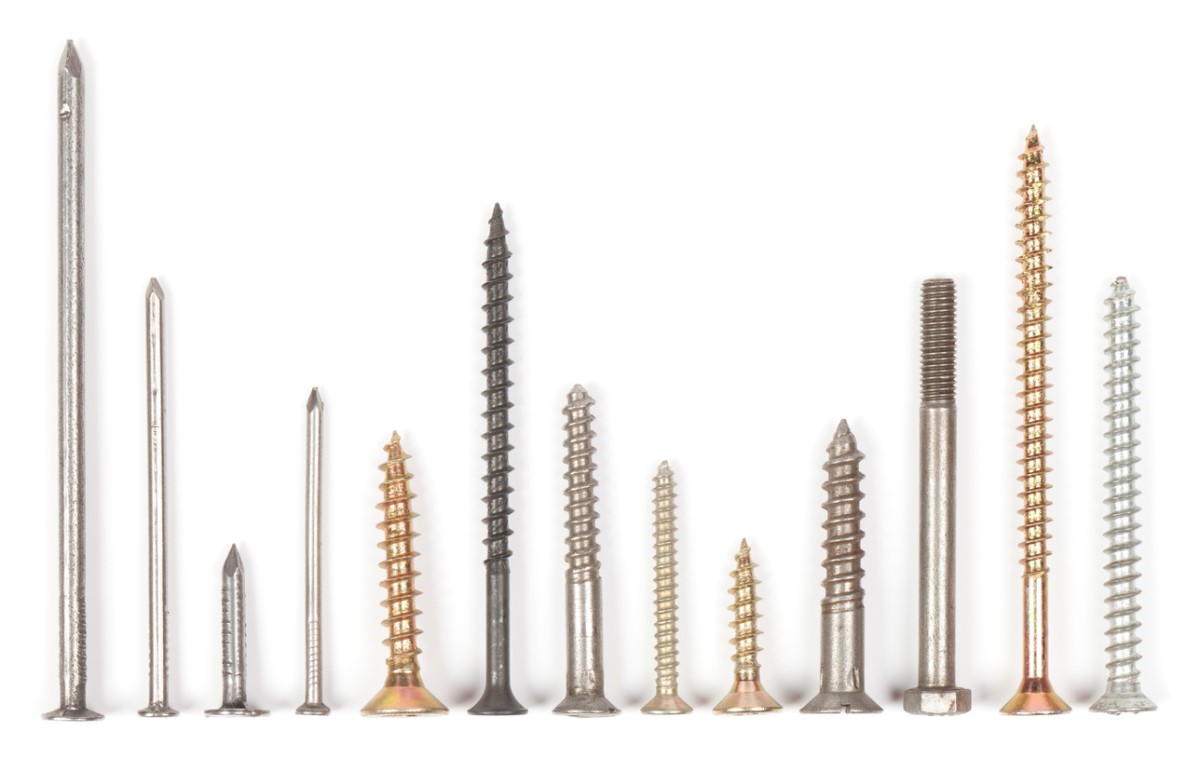Choosing between nails and screws can feel like standing at a crossroads. You’re about to embark on your next big project, and the choice between these two fasteners is crucial.
Have you ever wondered why sometimes your DIY masterpiece stands the test of time, while other times, it crumbles apart? The answer often lies in the seemingly simple decision of nails versus screws. This blog post is crafted to help you make informed choices that lead to stronger builds, lasting durability, and the satisfaction of a job well done.
Dive in to discover the unique strengths and ideal uses of nails and screws, and transform your projects from ordinary to extraordinary.

Credit: mosbybuildingarts.com
Fasteners Overview
Welcome to the world of fasteners, where nails and screws reign supreme. These small but mighty tools are essential in construction, woodworking, and DIY projects. But choosing between nails and screws can be tricky if you’re not familiar with their unique features and benefits. Let’s dive into what makes each of them special and how you can make the right choice for your project.
What Are Fasteners?
Fasteners are devices used to connect or secure materials together. They’re the unsung heroes of construction projects. Imagine trying to build a bookshelf without them—it would be chaos! Fasteners range from simple nails to complex screws, each with its own purpose and strength.
Types Of Fasteners
- Nails:Often used for quick and simple jobs. They are perfect for tasks that don’t require high strength.
- Screws:Provide better hold and can be easily removed. Ideal for projects needing precision and durability.
Personal Experience: Choosing The Right Fastener
Last summer, I built a treehouse for my kids. Initially, I used nails for the wooden planks but soon realized screws provided a sturdier hold. The treehouse was wobbling, and it was a great lesson learned on the importance of selecting the right fastener.
Strength And Durability
Screws offer greater strength compared to nails. Their threads allow them to grip better, making them suitable for heavy-duty tasks. Nails, however, are great for projects where speed matters more than strength.
Ease Of Use
Nails are easy to hammer in, making them the go-to for quick fixes. Screws require a bit more effort, often needing a drill. But the effort pays off in stability and longevity. Which would you prefer for your project?
Cost Considerations
Nails are generally cheaper than screws. They are a budget-friendly option for short-term projects. Screws, though pricier, offer lasting value. Consider your project’s needs and budget before deciding.
Environmental Impact
Using screws can reduce waste because they’re reusable. Nails often bend and become unusable after one use. If sustainability is important to you, screws might be the better option.
Conclusion: Making The Right Choice
Choosing between nails and screws depends on your project’s requirements. Consider the strength, ease of use, cost, and environmental impact. What are your priorities? Understanding these factors will guide you in making the best decision for your next project.
Nails: Characteristics And Uses
Nails, known for their smooth, slender shape, are ideal for quick and temporary fixes. Unlike screws, they lack threads and rely on friction to hold materials together. Nails are commonly used in woodworking and construction, where speed is crucial.
Nails have been used in construction for centuries. They serve as essential tools in woodworking, crafting, and building. Their simplicity and effectiveness make them a popular choice for many projects. Understanding their characteristics and uses can help you choose the right fastener for your needs.
Material And Design
Nails are typically made from steel, aluminum, or brass. Their design includes a pointed tip and a flat head. This design allows them to penetrate wood or other materials easily. Some nails have ridges or grooves for better grip. Others have coatings to resist rust and improve longevity.
Common Applications
Nails are used in framing, roofing, and carpentry. They hold pieces of wood together securely. Nails work well in projects like building furniture or installing drywall. They also serve in arts and crafts projects. Their versatility makes them useful in various situations.
Advantages Of Nails
Nails are simple to use. They require minimal tools for installation. You can often hammer them in without pre-drilling holes. They are cost-effective and widely available. Nails offer quick assembly for many tasks. Their efficiency saves time during construction.
Limitations Of Nails
Nails may not hold as well in certain materials. They can loosen over time with movement. Nails are less effective in high-stress applications. They do not provide as strong a bond as screws. Nails may cause wood to split if not used carefully.
Screws: Characteristics And Uses
Screws are essential fasteners in construction and DIY projects. They hold objects together securely. With their unique design, screws offer stability and strength. They are versatile and come in various types for different tasks.
Material And Design
Screws are made from metal, plastic, or composite materials. Metal screws are popular for their strength and durability. They have threaded shafts, which help in gripping surfaces tightly. The head can be flat, round, or hexagonal. Each type serves a specific function. The design ensures easy insertion and removal.
Common Applications
Screws are widely used in furniture assembly. They secure wooden parts effectively. They are crucial in building structures like decks and fences. Electronics rely on screws for casing and component stability. In household repairs, screws fix loose items quickly.
Advantages Of Screws
Screws provide strong and secure connections. They are reusable, allowing adjustments and repositioning. They offer precise control over depth and tightness. Screws resist rust and corrosion, ensuring longevity. They are ideal for both temporary and permanent fixes.
Limitations Of Screws
Screws may split delicate materials during insertion. They require pre-drilled holes in hard surfaces. Over-tightening can damage the material or screw itself. Screws are less effective in soft materials without proper support. They may loosen under constant vibration.
Comparison Of Nails And Screws
When you’re embarking on a project, the choice between nails and screws can significantly impact the outcome. These two fasteners might seem interchangeable, but they offer distinct advantages depending on your needs. Whether you’re building a bookshelf or repairing a deck, understanding the strengths and weaknesses of each can help you make informed decisions.
Strength And Durability
Screws generally offer greater strength and durability compared to nails. Their threaded design allows them to hold materials together more securely. You might recall that time when you built a garden shed and opted for screws. The structure stood firm against strong winds, proving the screw’s superior grip.
Nails, on the other hand, are less likely to break under pressure. They have a smooth surface, which helps them withstand shear forces better. Consider when you installed baseboards in your living room; nails worked perfectly, as they didn’t need to bear significant weight.
Ease Of Use
Nails are usually easier to work with, especially for quick projects. You can hammer them in swiftly without the need for a drill. Think about assembling a wooden fence; you can nail it together in no time.
Screws require more effort and the right tools, but they offer precision. If you’ve ever hung shelves, you know screws allow for adjustments, ensuring everything is level. Their versatility in placement can be a lifesaver when accuracy is key.
Cost Considerations
Nails are typically cheaper than screws. For large-scale projects, like a backyard deck, nails can be a cost-effective option. You might find yourself saving a significant amount when the budget is tight.
However, screws offer better long-term value. Their durability means fewer replacements over time. Reflect on your kitchen renovation where you chose screws, knowing they would sustain cabinets better through daily use.
Application Specific Needs
Choosing between nails and screws often depends on the specific demands of your project. Nails excel in situations where you need flexibility, like temporary structures. You might recall a stage set you helped build; nails allowed for quick assembly and easy dismantling.
Screws are perfect for permanent fixtures requiring strong holding power. Remember that treehouse you crafted; screws ensured the safety and stability needed for years of enjoyment. They provided peace of mind, knowing the structure would endure playful adventures.
So, what are your current project needs? Consider the factors above when deciding between nails and screws. The right choice can make a world of difference in the durability and success of your work.
Choosing The Right Fastener
Choosing the right fastener is crucial for any construction project. Nails and screws are the most common types of fasteners. Each has its own benefits and best-use scenarios. Understanding the differences helps in making an informed choice. Consider the project requirements, material compatibility, and environmental factors. This ensures the strength and longevity of your work.
Project Requirements
Different projects demand different fasteners. For temporary structures, nails are often preferred. They are quick to install and easy to remove. For permanent structures, screws offer better holding power. They are ideal for projects needing long-term stability. Assess the specific needs of your project first.
Material Compatibility
Fasteners must match the materials used. Nails work well with wood due to their flexibility. They absorb shocks and vibrations efficiently. Screws excel with dense materials like metal or hardwood. They provide a strong grip and resist pull-out forces. Match your fastener to your materials for best results.
Environmental Considerations
Consider the environment where your project is located. Nails may corrode faster in humid or salty areas. Screws often have protective coatings that resist rust. They are a better choice for outdoor projects. Think about weather and climate when selecting fasteners. This ensures your project withstands the test of time.

Credit: mtcopeland.com
Expert Tips For Fastener Selection
Choosing the right fastener can make or break your project. Whether you’re building a piece of furniture or fixing a shelf, understanding the nuances of nails and screws is crucial. Selecting the appropriate fastener isn’t just about holding things together; it affects the durability and aesthetics of your work. Let’s dive into expert tips to make the perfect choice for your DIY or professional projects.
Professional Insights
Experienced builders often prefer screws over nails for tasks requiring more precision and strength. Screws provide a tighter grip, making them ideal for projects needing long-lasting stability. However, nails are quicker to install and can be a better choice for temporary or less demanding constructions. Consider the materials you’re working with—wood, concrete, or drywall—as this impacts your choice.
Think about the load your project will carry. Heavy items demand the reliability of screws, while lightweight structures might thrive with nails. Your project location also matters; outdoor projects, for example, often need screws that resist rust and corrosion. Always have a variety of sizes on hand to match your project needs.
Common Mistakes To Avoid
A frequent mistake is using nails where screws are needed for stability. This can lead to your project falling apart sooner than expected. Don’t underestimate the importance of fastener size. Incorrect sizing can compromise structural integrity, leading to a shaky outcome.
Another blunder is neglecting the material compatibility. Using the wrong type of screw or nail can damage your materials, causing splits or cracks. Always ensure your fastener matches the material specifications. Over-tightening screws is a common error that can strip the threading, reducing holding power.
Have you ever found a shelf collapsing unexpectedly? This often results from using the wrong fastener or installing it incorrectly. Take the time to plan your fastener choice; it can save you from costly repairs and frustrations.
Engage with your project like a seasoned pro by focusing on these fastener insights. What challenges have you faced with fastener selection in your projects? Share your thoughts and let’s learn from each other’s experiences.

Credit: www.bobvila.com
Frequently Asked Questions
What Are The Main Differences Between Nails And Screws?
Nails are faster to use, ideal for soft materials. Screws provide strong hold, useful for hard surfaces.
Which Is Better For Wood Projects, Nails Or Screws?
Screws are better for wood projects. They offer strong grip and can be easily removed or adjusted.
Do Nails Hold Up Well In Outdoor Conditions?
Nails can rust and loosen outdoors. Screws with corrosion-resistant coating are better for outdoor projects.
Can Screws Be Used For Drywall?
Yes, screws are preferred for drywall. They provide better hold and prevent wall damage compared to nails.
Are Nails Cheaper Than Screws?
Generally, nails are cheaper. But screws offer better durability and strength, justifying their higher cost.
Conclusion
Choosing between nails and screws depends on your project needs. Nails work well for quick tasks. Great for wood and framing. Screws offer strength. Ideal for heavy-duty jobs. Easy to remove if needed. Both have their place in construction. Consider the material.
Think about the load. Evaluate the environment. Each tool has its pros and cons. Make your choice based on the task. Understanding these differences aids in decision-making. Achieve better results with informed choices. Your project will thank you.





